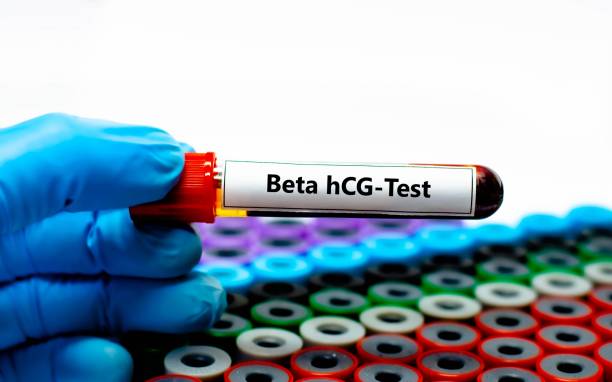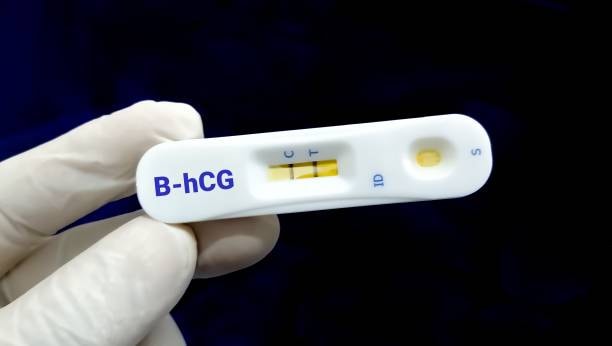
Beta hCG Test: Normal Levels, Ranges & How to Read Your Pregnancy Results
Time to read 7 min
Time to read 7 min
Table of contents
hCG Test, also called the quantitative hCG test it is performed to measure the level of human chorionic gonadotropin hormone through blood or urine samples.
Primarily, the hCG test is used to confirm pregnancy, track the development, and help detect certain medical concerns, including hCG-secreting tumors. The beta hCG test is used to evaluate the beta subunit of the hCG hormone in the blood that is formed by the placenta after the fertilized egg implants in the uterus, and can also indicate hCG-secreting tumors.
This article covers all you should know about the Beta HCG test, normal hCG levels, and how the hCG blood test is associated with pregnancy test., so stay tuned.
The hCG test measures human chorionic gonadotropin (hCG) hormone levels in the blood, particularly the beta subunit of hCG. The placenta produces hCG during pregnancy, and the hormone can be detected in the blood after 10 days of conception.
HCG test can also detect potential miscarriages, including early miscarriage and ectopic pregnancies, and the test hCG levels, as the test results are critical for proper diagnosis. , along with other hCG-associated conditions.
The HCG test measures the amount of hCG hormone in the blood to confirm pregnancy and provide a positive result, evaluate if it’s a healthy pregnancy, and diagnose possible or existing complications in pregnancy, as advised by a healthcare provider.
This test spots the presence or absence of the hCG hormone to confirm a positive pregnancy test.
This test assesses particularly the hCG levels in the blood sample that help track the pregnancy progression, especially during the first trimester. and detect possible complications.
A positive hCG test indicates pregnancy, while abnormal (low or gradually-rising hCG levels) indicate potential complications such as miscarriage or ectopic pregnancy, and the hormone produced can provide vital information. High hCG may be associated with molar pregnancies or multiple pregnancies.
During pregnancy, the cells that form the placenta release the human chorionic gonadotropin (hCG) hormone. The pregnancy hormone levels in the blood confirm pregnancy and monitor its development, and assess the gestational age.
This hormone can be detected during the early pregnancy, that is, 10 days after conception. Typically, the hCG levels double every 72-90 hours during the early pregnancy phase. The highest beta hCG hormone levels can be noticed during 8-12 weeks. and then decrease gradually.
The placenta produces the human chorionic gonadotropin hormone, especially the trophoblast cells, which are significant in gestational trophoblastic disease. that form the placenta after the fertilized egg implants in the uterus. These cells start forming hCG soon after implantation, and then the hormone is released into the urine and blood of the female.
Human chorionic gonadotropin hormone and its levels in the blood are significant indicators of a normal pregnancy. Generally, non-pregnant people have hCG levels below 5 miu mL, which is considered outside the normal range, and they rise rapidly during the first trimester of pregnancy.
Refer to the chart mentioned below for week-to-week hCG ranges during pregnancy:
Weeks Since LMP (Last Menstrual Period) |
HCG Levels (mlU/mL) |
3 Weeks |
5 to 50 mlU/mL |
4 Weeks |
5 to 426 mlU/mL |
5 Weeks |
18 to 7340 mlU/mL |
6 Weeks |
1080 to 56500 mlU/mL |
7-8 Weeks |
7650 to 229000 mlU/mL |
9-12 Weeks |
25700 to 288000 mlU/mL |
13-16 Weeks |
13300 to 254000 mlU/mL |
17-24 Weeks |
4060 to 165400 mlU/mL |
25-40 Weeks |
3640 to 117000 mlU/mL |
The baseline hCG levels in non-pregnant people are extremely low, usually below 5 mlU/mL. These levels are normal hCG levels that do not indicate pregnancy.
Human chorionic gonadotropin levels measured through a quantitative test confirm pregnancy. To confirm pregnancy, it is important to test hCG levels; generally, hCG levels above 25 mlU/mL are considered positive for pregnancy, while those below 5 mlU/mL are considered negative.
The HCG test is performed using a blood or urine sample, as the blood test measures hormone levels. During the blood sample collection, a medical professional draws a blood sample from a vein in your arm using a needle. The blood sample is then analysed in the laboratory.
For a urine test, the healthcare professional instructs you to collect a urine sample in a sterile container, typically the first urine in the morning. Then the urine sample is analysed in the laboratory.
Typically, the hCG test results are available within one or two days. Your healthcare provider will review the pregnancy test results to confirm pregnancy health. and development, or any kind of potential concerns.
Abnormal hCG levels may signify various health conditions that may or may not be associated with pregnancy.
Low HCG Levels in Pregnancy: Indicate ectopic pregnancy or potential miscarriage.
High HCG Levels in Pregnancy: Indicate molar pregnancy, multiple pregnancies, or gestational trophoblastic disease.
Fluctuating HCG Levels in Pregnancy: During the early pregnancy, typically, the hCG levels double every 72 to 90 hours, and notable deviations from this pattern may be associated with potential concerns.
Beta hCG test and other pregnancy tests detect pregnancy by detecting the presence of hCG; however, they differ in their approach, with beta hCG tests providing a quantitative result while other pregnancy tests are typically qualitative tests.
Beta hCG tests assess the amount of hCG, presenting a quantitative result; on the other hand, other pregnancy tests that are usually urine-based detect the existence of hCG, offering a qualitative result.
A beta hCG pregnancy test not only confirms pregnancy but is crucial for monitoring the pregnancy progression, especially after fertility treatment, and diagnosing possible pregnancy-related complications such as miscarriage and ectopic pregnancy.
Commonly, urine tests are used to detect pregnancies, but blood tests provide more accurate and detailed information, including fetal health, and can detect potential concerns.
HCG blood test can monitor hormone levels, tracking the pregnancy health in early stages. It can help identify if the fertilized egg has implanted outside the uterus (ectopic pregnancy) and the potential risk of miscarriage.
Human Chorionic Gonadotropin.
The normal beta hCG level during pregnancy varies depending on the gestation stage and is crucial for determining normal values; however, typically hCG levels below 5 mlU/mL are considered negative and above 25 mlU/mL are considered positive pregnancy.
A beta hCG test can detect pregnancy after 6-8 days of ovulation. However, it is advised to wait for at least 7 days after a missed period and 10 days after ovulation for the most reliable results.
A negative hCG report with hCG levels below 5 mlU/mL means negative pregnancy, and the woman is not pregnant.
The pregnancy hormone usually clears from the female body within 7 to 60 days after childbirth or termination of pregnancy. The exact time depends on many factors.
***Medical Disclaimer - The following information is for educational purposes only. No information provided on this website, including text, graphics, and images, is intended as a substitute for professional medical advice. Please consult with your doctor about specific medical advice about your condition(s).
